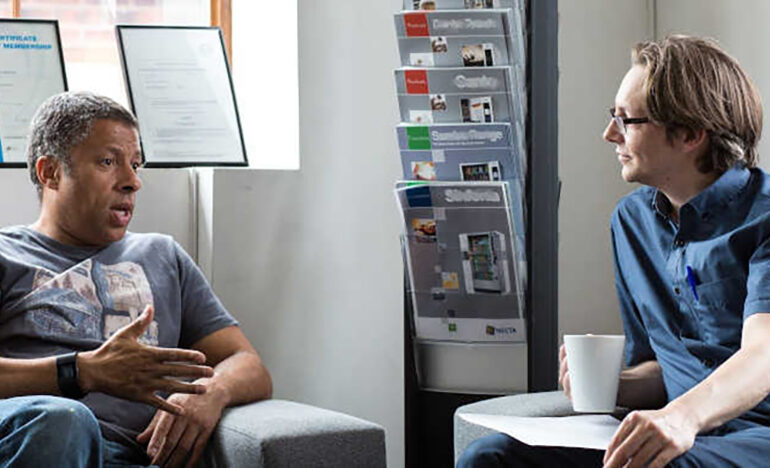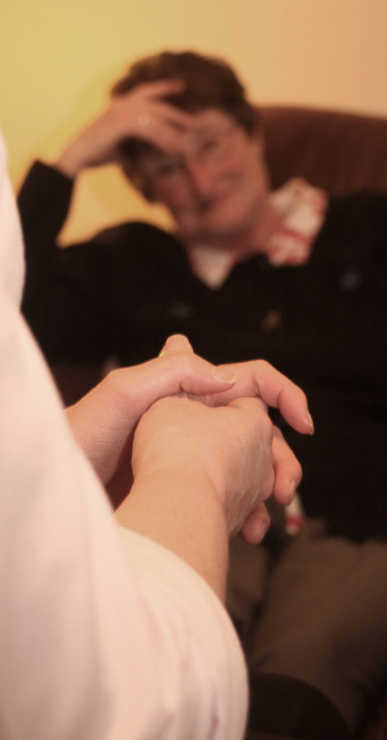Spiritual Direction: A Path to Interior Freedom

By Kathy Keary
Spiritual direction is not new. It enjoys a long history in many faith traditions. For centuries, people have sought the wisdom of shamans, rabbis, buddhas, spiritual directors, imams, sheiks, prophets, abbas and many other spiritual gurus. The purpose and function of these figures has varied over the years and in different traditions.
In today’s world, a spiritual director serves as a witness to God’s presence and activity in the life of the directee. Spiritual direction is the intentional conversation between two people as they listen for the sacred manifested in the directee’s life. In the process, the awareness of God revealed in the details of our lives is increased as is the realization of the power of the divine life within us.
The term “spiritual direction” is deceiving and inadequate to describe the purpose and content of a spiritual direction session. The focus is not only on a person’s spiritual life but on the whole person: physical, mental, emotional, and spiritual. One aspect of a person’s life will invariably impact other aspects. For instance, a physical impairment will often impact an individual on a mental, emotional, and spiritual level.
Never miss an article published to the Renewal Center website: Sign up to receive our newsletters
The word “direction” is also deceiving as it gives the impression that a spiritual director’s responsibility is to provide instruction or advice. In reality, that rarely happens. Spiritual direction honors that the wisdom lies within each of us. The director’s role is to faithfully and prayerfully accompany another facilitating the revelation of the stirrings of the directee’s heart.

The true director in spiritual direction session is the Holy Spirit who guides and inspires both parties. The director serves as a channel of God’s grace.
As a director, I typically begin each session with a moment of silence to allow space for both parties to connect with the Indwelling Spirit and acknowledge the divine presence accompanying, guiding, and inspiring us.
When I am the directee, I am often surprised at the direction the Spirit leads me in a session. It’s key that both the director and the directee be open to the influence of the Spirit. Allow the Spirit to blow where it will.
The reasons that people seek spiritual direction are varied. Often the impetus is to grow in one’s relationship with God or restore a sense of the presence of God in their life. Frequently people are seeking to discern where God is leading them. The need for healing is also a common motivator as is the desire to strengthen one’s prayer life. Relationship or family issues often bring an individual to spiritual direction as does a loss, a sense of the lack of purpose, or a dry spell in one’s prayer life.
The role of a spiritual director is to help others explore their experiences with a lens of faith appreciating all of life as a sacred journey. This increases an individual’s recognition and trust in divine action and guidance. As we become more aware of God’s presence in our lives, the gate opens that allows the Spirit to flow through us to others.
There are many benefits to sharing our experiences of God with others. In telling our story, we relive the richness of an experience. The encounter comes alive and seems more real. By giving voice to it, we acknowledge that the episode was not imagined but was an actual happening. Our experience may be brief, but savoring it allows it to live on and continue to impact us. It promotes a fuller and deeper response from us. It increases our awareness of God’s felt presence in our lives. In the telling, we are changed.
Spiritual direction fosters the development of a felt sense of interior freedom. As one learns more about themselves and travels along an intentional spiritual path, their connection to others and God grows. A profound sense of unity with God, others, and all of creation is a likely development. This propels a person into the world to make a difference as they continue to become more and more the person they were created to be.
Precious Blood Renewal Center is now offering two experiences in spiritual direction. You might want to try one or both of these. These experiences usually happen in face-to-face situations, but we’ve adapted them for the special time we live in now. These two options allow you to develop your spiritual life and stay safe. Click on the links to learn more.
• Individual Spiritual Direction by Zoom or Phone. This page includes descriptions of spiritual directors associate with the Renewal Center.
• A Three-Day, Stay-at-Home Directed Retreat This pages outlines the schedule of the retreat and tells you how to sign up and what it costs.
Are you curious, but aren’t sure? Here’s one suggestion: you could schedule an appointment with a spiritual director to see if the three-day retreat is for you.
Note: New articles in this series are posted to the website every Monday. The full series can be found here: An Invitation to Something New: The Contemplative Life. On Thursday’s we’ll send an email to remind you of the articles.
[Kathy Keary, a Precious Blood Companion and spiritual director, holds a master’s degree in theological studies and is a graduate of the Atchison Benedictine’s Sophia Center’s Souljourners Program, an intense study of spirituality and spiritual direction. Kathy believes that the divine is present and active in all of life and encourages others to be awakened to the God in all including the divine within. She enjoys accompanying others on their journey to wholeness discovering the person they were created to be.]
Top image is by jamesoladujoye from Pixabay. Second image is “Counseling” by Alan Cleaver is licensed under CC BY 2.0.
We’d Like to Hear From You!
We’d like to know what you think about our The Contemplative Life Series. Send us a comment using the form below. Do you have a suggestion? Is there something you want to learn more about? Send us a note.
[gravityform id=”7″ title=”true” description=”true”]
Related
Lent Video Six – Holy Week Meditation: ‘Remember Me As You Come Into Your Kingdom’
In today’s guided meditation, Fr. Ron again leads you into an intimate conversation with Jesus while holding a cross or crucifix in your hands.

What’s the Problem?
By Fr. Garry Richmeier, C.PP.S.
You can’t fix a relationship or a behavior like a mechanic fixes a car or a surgeon “fixes” a patient. Behaviors and relationships don’t have parts that can be fixed or replaced when the break or malfunction.
Categories
Assembling God's Puzzle Coffee with Padre Cooking & Spirituality Encounters of the 4th Kind Family Matters Reflections on the Eucharsitic Prayers Spiritual Resources Taize Prayers The Contemplative Life Traveling with Pilgrims of Hope Uncategorized Videos Week of Prayer for Uhristian Unity When you need a little help
